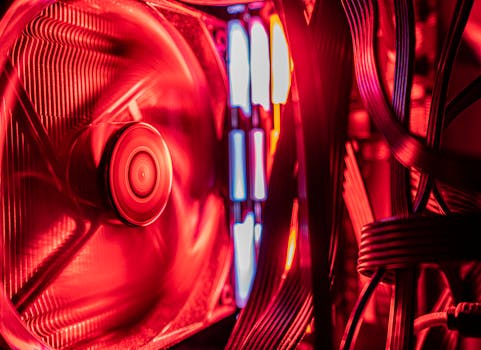Tired of flashy gaming hardware that promises the world but delivers little? This article cuts through the marketing fluff, revealing the PC gaming hardware upgrades that truly matter and exposing common gimmicks designed to drain your wallet.

The PC gaming world is a dazzling landscape of innovation, constantly pushing the boundaries of performance and immersion. However, amidst the genuine advancements, a sea of marketing hype often obscures the path to truly impactful upgrades. It's easy to get caught up in the latest trends, chasing marginal gains while neglecting the core components that truly define your gaming experience. This article aims to cut through the noise, helping you distinguish between essential upgrades and expensive gimmicks, ensuring your hard-earned money is spent wisely.
The Pillars of Performance: Where Your Money Matters
Investing in the right components can dramatically improve your gaming experience. These are the areas where upgrades typically yield the most significant results:
# CPU: The Brains of the Operation
Your Central Processing Unit (CPU) is the heart of your gaming rig, responsible for handling complex calculations and managing various tasks. While a top-of-the-line CPU isn't always necessary, especially at higher resolutions where the GPU becomes the bottleneck, a modern and capable CPU is crucial for smooth gameplay, especially in CPU-intensive games like strategy titles or open-world adventures.
- Practical Tip: Consider the number of cores and threads. Games are increasingly leveraging multi-core processors. Research benchmarks specific to the games you play to determine the optimal CPU for your needs. Websites like PassMark and Gamers Nexus offer detailed CPU benchmarks.
# GPU: The Visual Powerhouse
The Graphics Processing Unit (GPU) is responsible for rendering the visuals you see on screen. It's arguably the most important component for gaming, especially if you're aiming for high resolutions and frame rates. Upgrading your GPU will almost always result in a noticeable improvement in graphical fidelity and performance.
- Practical Tip: Check the VRAM (Video RAM). Games with high-resolution textures and complex effects require ample VRAM. Consider your target resolution and refresh rate when choosing a GPU. A 4K monitor demands a more powerful GPU than a 1080p display. Look at websites like TechPowerUp and Tom's Hardware for GPU reviews and comparisons.
# RAM: Memory for Smooth Multitasking
Random Access Memory (RAM) is your system's short-term memory, used to store data that the CPU and GPU need to access quickly. Insufficient RAM can lead to stuttering, lag, and even crashes, especially when running multiple applications simultaneously.
- Practical Tip: 16GB of RAM is generally considered the sweet spot for modern gaming. However, for demanding games and multitasking, 32GB can provide a noticeable performance boost. Make sure to check your motherboard's RAM speed compatibility and enable XMP (Extreme Memory Profile) in your BIOS for optimal performance.
# Storage: Speeding Up Load Times
Solid State Drives (SSDs) have revolutionized storage technology, offering significantly faster read and write speeds compared to traditional Hard Disk Drives (HDDs). Installing your operating system and games on an SSD will drastically reduce load times and improve overall system responsiveness.
- Practical Tip: NVMe SSDs are even faster than SATA SSDs, offering the best possible performance. Consider installing your operating system and frequently played games on an NVMe SSD for the quickest load times. A smaller SATA SSD can be used for less frequently played games.
The Allure of Gimmicks: Buyer Beware
While genuine innovations exist, the PC gaming market is also rife with products that prioritize aesthetics and marketing over actual performance gains. Here are some common gimmicks to be wary of:
# Excessive RGB Lighting
While RGB lighting can add a touch of personalization to your gaming setup, excessive RGB offers no performance benefit. Focus on components that improve gameplay rather than solely on aesthetics. Remember, performance is king. A solid black case with high-end components will always outperform a rainbow-lit rig with subpar hardware.
# High-Refresh Rate Monitors (Beyond Your GPU's Capabilities)
A high-refresh rate monitor (144Hz or higher) can provide a smoother and more responsive gaming experience, but only if your GPU can consistently output frames at or near that refresh rate. Pairing a high-refresh rate monitor with a weak GPU will result in screen tearing and a suboptimal experience. Prioritize matching your monitor's refresh rate to your GPU's capabilities.
- Practical Tip: Use frame rate monitoring software (like MSI Afterburner) to track your GPU's performance in your favorite games. If your frame rates consistently fall below your monitor's refresh rate, consider upgrading your GPU before investing in an even higher refresh rate monitor.
# Overclocking (Without Proper Cooling)
Overclocking can squeeze extra performance out of your CPU and GPU, but it also generates more heat. Overclocking without adequate cooling can lead to instability, reduced component lifespan, and even permanent damage. If you're considering overclocking, invest in a high-quality CPU cooler and ensure proper case airflow.
- Practical Tip: Research your CPU and GPU's overclocking potential and safe temperature limits. Start with small incremental increases and thoroughly test stability after each change. Never exceed the manufacturer's recommended voltage limits.
# Expensive Gaming Peripherals (Beyond Ergonomics)
While a good gaming mouse and keyboard are essential, excessively expensive peripherals often offer marginal improvements over more reasonably priced options. Focus on ergonomics, comfort, and responsiveness rather than simply chasing the highest DPI or the most customizable buttons. A comfortable and well-designed mouse and keyboard will improve your gaming experience far more than a flashy, overpriced one.
Conclusion: Smart Upgrades, Smarter Gaming
In the ever-evolving world of PC gaming hardware, it's crucial to be a discerning consumer. By understanding the core components that drive performance and recognizing common marketing gimmicks, you can make informed decisions that maximize your gaming experience without breaking the bank. Focus on upgrading your CPU, GPU, RAM, and storage with high-quality components, and don't be swayed by flashy features that offer little to no tangible benefit. Happy gaming!
